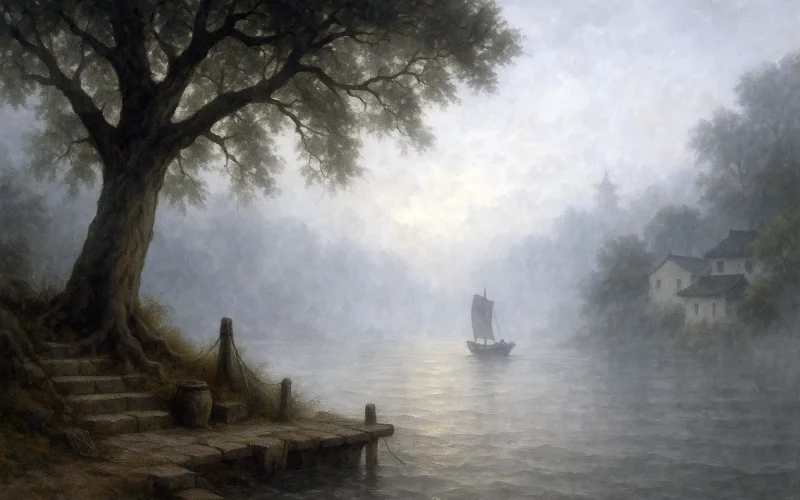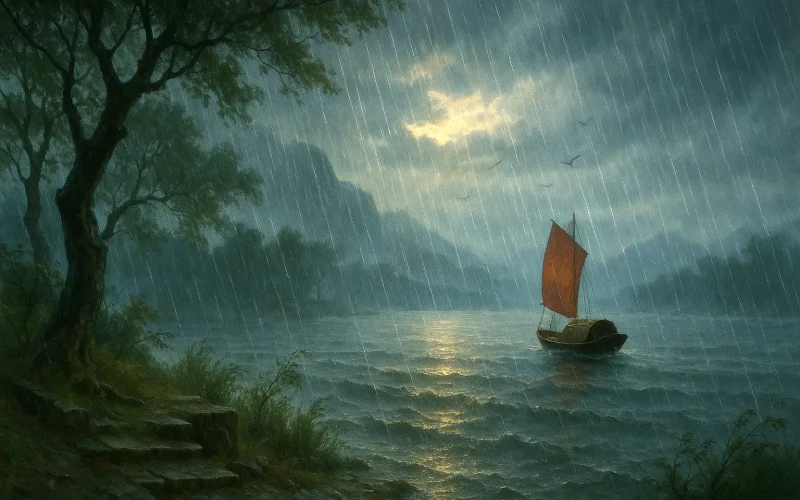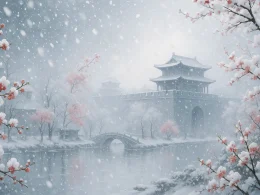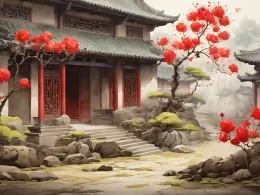Wistful, away from my friends and kin,
Through mist and fog I float and float
With the sail that bears me toward Loyang.
In Yangzhou trees linger bell-notes of evening,
Marking the day and the place of our parting…
When shall we meet again and where?
…Destiny is a boat on the waves,
Borne to and fro, beyond our will.
Original Poem
「初发扬子寄元大校书」
韦应物
凄凄去亲爱,泛泛入烟雾。
归棹洛阳人,残钟广陵树。
今朝为此别,何处还相遇。
世事波上舟,沿洄安得住。
Interpretation
Composed by Wei Yingwu during his northward journey from Yangzhou to Luoyang, this poem was written as his boat departed Guangling through misty canals. The melancholic farewell to his friend Yuan Da intertwines with the hazy riverscape, where temple bells, distant trees and passing boats all become vessels of parting sorrow. Blending personal grief with reflections on life's impermanence, this emotionally resonant work stands as a masterpiece among Wei's lyrical poems.
First Couplet: "凄凄去亲爱,泛泛入烟雾。"
Qī qī qù qīn ài, fàn fàn rù yān wù.
Heartsick, I leave my dearest friend; Adrift, we enter mist without end.
The reduplicated "heartsick" (凄凄) establishes the elegiac tone, intensifying the sorrow of separation. "Dearest friend" (亲爱) reveals profound affection, while "adrift" (泛泛) and "mist" (烟雾) symbolize both the physical journey and emotional bewilderment. This perfect fusion of scene and sentiment exemplifies classical Chinese poetry's aesthetic ideal.
Second Couplet: "归棹洛阳人,残钟广陵树。"
Guī zhào Luòyáng rén, cán zhōng Guǎnglíng shù.
My Luoyang-bound oars dip and rise; Guangling's fading bells, trees' silhouettes.
Transitioning to sensory imagery, the couplet captures lingering attachments through auditory ("fading bells") and visual ("trees' silhouettes") memories. The partitive "fading" (残) suggests both the receding temple bells and diminishing connections, crafting a poignant leave-taking scene where sound and vision intertwine.
Third Couplet: "今朝为此别,何处还相遇。"
Jīn zhāo wèi cǐ bié, hé chù huán xiāng yù.
This morning brings our last embrace; Where shall we meet again, what place?
The direct address transforms personal farewell into universal meditation on separation. The rhetorical question "Where shall we meet?" expresses not just geographical uncertainty but existential transience, elevating private emotion to philosophical contemplation.
Fourth Couplet: "世事波上舟,沿洄安得住。"
Shì shì bō shàng zhōu, yán huí ān dé zhù.
Worldly affairs are boats on swells; Borne by currents, who foretells?
The concluding metaphor crystallizes life's impermanence - human existence as boats tossed by unpredictable currents. The verbs "borne" (沿) and "tossed" (洄) depict our helplessness against fate's tides, transforming a farewell poem into profound ontology.
Holistic Appreciation
The poem progresses with structural precision from personal grief ("heartsick") through sensory remembrance ("fading bells") to cosmic meditation ("boats on swells"). Wei transforms a simple farewell into an existential journey where particular sorrow ("dearest friend") expands into universal truth ("worldly affairs"). The language's deceptive simplicity - unadorned yet profound - creates endless reverberations that linger like the fading temple bells.
Artistic Merits
Mastering the "scene-emotion fusion" technique, Wei employs reduplication ("heartsick," "adrift") for rhythmic emotional intensity. Multisensory imagery (auditory bells, visual trees) constructs vivid tableaux, while the boat metaphor organically elevates personal experience to philosophical plane. The poem's power lies in its seamless movement from concrete farewell to abstract meditation, achieving sublime unity of form and content.
Insights
This meditation on impermanence teaches that human connections, like boats on water, are subject to life's unpredictable currents. Rather than resisting transience, Wei finds beauty in embracing the present moment - the "fading bells" become reminders to cherish what we hold before it slips away. In our mobile modern world, this Tang dynasty wisdom about treasuring connections amidst constant change remains profoundly relevant.
Poem translator
Kiang Kanghu
About the poet

Wei Yingwu (韦应物), circa 737 - 786, was a native of Chang'an, Beijing. His poems were collected in the Wei Suzhou Collection, which included poems concerned with the plight of the people, expressions of disobedience to the times and indignation against the world, and descriptions of idyllic landscapes, etc., of which the ones describing idyllic landscapes are the most famous, and have been sung by posterity in particular.












